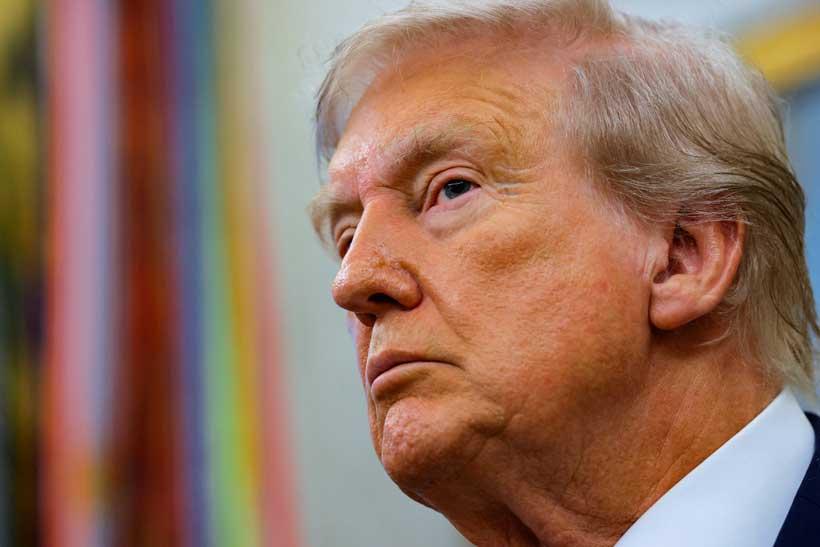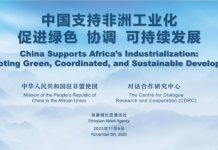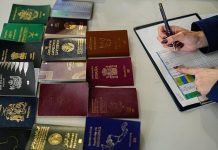By
Ezra Nnko
Africa-Press – Mauritius. “This flight took individuals so uniquely barbaric that their home countries refused to take them back”, – US Homeland Security Department Assistant Secretary Tricia McLaughlin.
In July 2025, five men from Cuba, Vietnam, Laos, Jamaica, and Yemen convicted of crimes in the US were deported to a tiny South African country, Eswatini. According to the US Homeland Security Department Assistant Secretary, Tricia McLaughlin, she referred to the deportees who were convicted of murder, child rape, and assault as “depraved monsters” who had been terrorizing American communities.
Before, another war-torn, poor country of South Sudan received eight deportees from the US who were convicted of violent crimes. These deportees were citizens from Myanmar, Vietnam, Laos, Mexico, South Sudan, and two Cubans.
As that’s not enough, in August 2025, Rwanda, a poor East African country, made a deal with the Trump administration to receive 250 deportees from the US, whom the US Secretary of State once quoted as calling them “the most despicable human beings”. The first batch, comprising seven people, was received in Kigali in August with no information provided on the identities of the deportees.
A few days later, Uganda, another poor East African country, declared reaching a temporary arrangement with the US government on receiving the “asylum seekers” deported from the US who do not wish to return to their home countries.
Recently, Ghanaian President John Dramani Mahama confirmed that Accra has reached an agreement with the Trump administration to receive deportees from the US who are from West African countries. According to President Mahama, Ghana had already received 14 people, including Nigerians and Gambians, who were being facilitated to return to their home countries at the time.
The Trump deportation programme
“Every time I come up and talk about what they have done to our country, I get angrier and angrier. The first time I ever said ‘garbage Can.’ But you know what? It’s a very accurate description…. We are a dumping ground; we are like a Garbage Can for the World. That’s what’s happened”. President Trump in Arizona during a presidential rally
During the 2024 US Presidential Campaign, President Trump promised the largest deportation of illegal immigrants if he were elected; as he referred to them as “illegal aliens”. Since taking the Oval Office in January 2025, President Trump, through the US Immigration and Customs Office, had deported nearly 350,000 people, mainly from South and Central America. It is expected that the deportation campaign could expand in the months to come, following the passage of the One Big Beautiful Bill Act in July 2025. This act tends to finance mass deportation, as it includes $45 billion for constructing detention facilities and $ 30 billion to fund the entire deportation process.
Deportation Campaign in Latin America
According to the U.S.-based migrant advocacy group, Witness at the Border, there have been more than six hundred deportation flights from January 2025 to July 2025. For instance, the report indicated that in July 2025, there were 1,214 deportation flights, a number higher than in January 2020, with most taken by military flights.
Most of these deportees end up in the so-called “Northern Triangle”, a triad of El Salvador, Guatemala, and Nicaragua. Since the deportation campaign began, these countries have received half of all deportees from the US through the “Safe Third Country Agreement,” where these countries became legally eligible to harbour deportees who are neither their citizens nor Americans.
Among many reasons mentioned for the signing of this agreement between the Trump administration and these Latin American countries are financial and political support. Despite President Nayib Bukele of El Salvador being criticized by Human Rights organizations for massive human rights violations, including torturing and unlawful deprivation of liberty of the Salvadoran people, militarization of law enforcement, and dismantling of institutional controls, President Trump had praised Bukele’s administration as “good help to the American people”.
During the Biden Administration, Bukele had a strained relationship with the Oval Office, to the extent that some of Bukele’s associates were sanctioned by the US for Corruption and human rights violation, leads to President Biden turned down a meeting with President Bukele in 2021.
At the GOP National Convention Presidential campaign in 2024, President Trump once quoted criticizing Bukele by stating that “President Bukele is sending all of his criminals, his drug dealers, his people that are in jails, to the United States….he is trying to convince everybody that a wonderful job he does in running the country. Well, he doesn’t do a wonderful job”.
That statement was a clear indication of what Trump would do when he gets into power, which meant he would definitely distract the Bukele administration. With the United States’ history of destabilizing South and Central American States, Bukele was right to worry and quickly switched sides and began playing the Donald Trump tone.
While visiting El Salvador in February, US Secretary of State Marco Rubio praised Bukele as he stated that “President Bukele has agreed to the most unprecedented, extraordinary, extraordinary migratory agreement anywhere in the world………… Not only (Bukele) is the strongest security leader in our region, (but) he’s also a great friend of our country”. Recently, Ana Maria Mendez Dardon, a Central America director at the Washington Office in Latin America, once quoted saying “El Salvador is the only country, at least in Central America, that has shown 100 percent willingness to do everything that the United States has required”.
Despite of political support from the Trump administration; the El Salvador government will receive 6 million dollars as agreed payment to host 300 deportees who are alleged members of Tren de Aragua, a gang group from Venezuela which the US has labelled as a “transnational criminal organization”.
Trump has also been using the deportation program to reset countries that, for some time, have been threatening the US hegemony and geopolitical influence in the Central and South American states.
In February 2025, Panama authorities held 299 deportees from the US in a hotel while giving them 30-90 “humanitarian days” to leave Panama and return to their home countries or to the other countries.
A few days after US Secretary of State, Marco Rubio visited Panama and threats President Jose Raul Mulino on how the US administration plans to take “measures necessary” concerning Panama relation with China in Panama Canal issue, suddenly President Mulino declared Panama a safe haven and a “bridge” for the US deportee as they waited to return to their countries of origin or third country.
Deportation in Africa: A Political Play
“The Trump administration is about deals, about deal-making, and any strongman would welcome that”—Marlon Agaba, Executive Director of Anti-Corruption Coalition in Uganda.
On February 2025, US sanctioned a close ally of President Paul Kagame who is Rwanda’s Minister of State for Regional and Integration, Mr. James Kabarebe and Lawrence Kanyuka Kingston, a Senior Member and Spokesperson of a largest rebel group operating in Democratic Republic of Congo; the Congo River Alliance which comprises of M-23 Rebel group for been linked with “violence and human right abuses” in DRC. Rwanda defined the act as a signal of “tough relations” with the US under President Trump, whom he later “commanded” the signing of the “Rwanda-Congo Peace Accords,” famously known as the “Doha Peace Agreement.”
The DRC had something to offer the US in exchange for a small privilege in the deal, mostly through the multinational companies’ mineral agreements. However, Rwanda had to provide something to be highly favored and considered in the Peace Accord too.
In August 2025, Rwanda struck deal with US and become a “third-party country” as a recipient of deportees from US. The agreement aimed at creating a balancing privilege with the Congo DRC in the eyes of Donald Trump, but also to soften the tough relations with the US. Although Rwanda had declared that it will set the conditions for individuals who would be accepted, it’s clear that the US will direct who would be welcomed in Kigali.
Rwanda has a history of using the “humanitarian perspective” as a way of obtaining a financial deal, as it happened from the “Rwanda Asylum Deal” signed in 2023 with the United Kingdom, where the Kigali government would be paid 120 million Euros for sheltering illegal immigrants and asylum seekers from the U.K. for five years. Due to legal and political reasons, the deal became unfruitful.
In the final days of US withdrawal in Afghanistan; U.N and US signed a “humanitarian deal” with Rwanda to host 250 refugees mostly girls who were banned to study by the Taliban administration and according to the International Organization for Immigration and the, School for Leadership, Afghanistan (SOLA), the Kigali government had received the financial assistance for hosting the Afghan Refugees Students in Rwanda.
In neighbouring country, Uganda, the Kampala administration has been using the copy and paste methods from Kigali, from hosting the Afghan girls to accepting the US deportees. President Yoweri Museveni, an 81-year-old president who recently bid to run for a seventh term, extending his nearly 40 years in power, is no stranger to engaging in confrontation with the US, particularly in criticism of his crackdown on opposition parties and undemocratic rule in a poor third-world country.
Museveni uses the US deportee deal to create a sustainable and peaceful relationship with the Trump administration, as Uganda’s participation in the African Growth Opportunity Act (AGOA) agreement was terminated in 2024 due to the 2023 Anti-Homosexuality Act. Also, Uganda has been facing a 15 percent tariff on agricultural products from the US administration, creating a stumbling block for export marketing. According to the Center for Global Development, Uganda’s USAID cuts were reduced to 66 percent, as it is included among the eight most affected countries with the cut-off. The sectors most affected by the cutoff are health production, humanitarian and refugee support, and healthcare.
Museveni attempts to bridge the relations and soften the tension through the Deportation deal, so as many African governments, including those of Eswatini, Ghana, South Sudan, and Rwanda.
Who knows who will be next in Africa, as everyone is eager to try to please President Trump and his administration.
In January 2015 Africa adopted the “The Agenda 2063: The Africa We Want” a blueprint and masterplan to transform Africa into a global powerhouse into the future. With this Shameless and Shameful deal, the Agenda 2063 will become just another African Paper Tiger Plan.
moderndiplomacy
For More News And Analysis About Mauritius Follow Africa-Press







